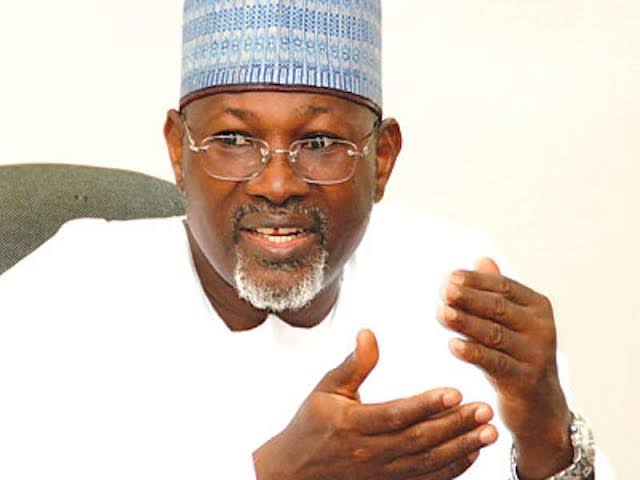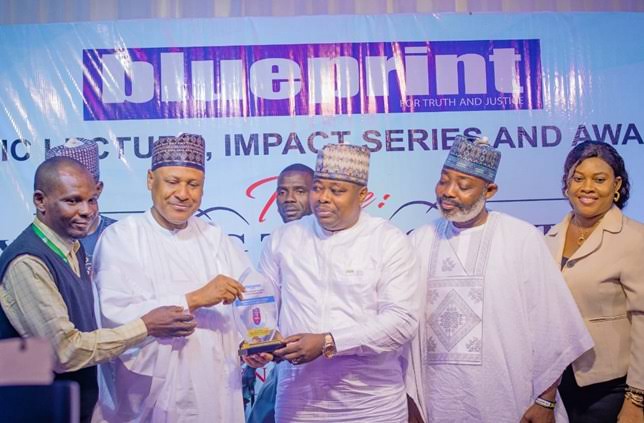By: Goodluck E. Adubazi, Abuja.
Former INEC Chairman and Special Adviser to the President on Livestock Reforms, Prof. Attahiru Jega, has stressed the urgent need for sweeping reforms in Nigeria’s livestock sector to ensure food security, economic growth, and national stability.
Delivering the keynote address at the 2025 Blueprint Newspapers Impact Series/Awards in Abuja, Prof. Jega described the livestock industry as a vital component of Nigeria’s agricultural economy—contributing an estimated 7–10% of GDP and supporting the livelihoods of over 20 million Nigerians.
“This is not merely a sub-sector of agriculture,” Jega stated. “It is a critical engine for rural development, nutrition, security, and foreign trade. Its untapped potential holds the key to Nigeria’s socio-economic transformation.”
According to Prof. Jega, the Nigerian livestock industry is currently valued between \$32 billion and \$42 billion, with projections estimating that the value could rise to between \$74 billion and \$96 billion by 2035, driven by renewed federal government initiatives and investment prospects.
He emphasized that while the sector offers immense opportunities for income generation, employment, and exports, its greatest potential lies in addressing Nigeria’s severe nutrition deficit.
“Nutrition security is a national emergency,” he said. “We rank poorly globally, with one of the highest rates of stunted children. Imagine the difference a glass of milk a day could make for our children’s health and future.”
However, Jega warned that this potential remains threatened by persistent structural inefficiencies, including outdated production systems, fragmented value chains, inadequate veterinary services, weak policy coordination, and chronic underinvestment.
He noted that the situation is further exacerbated by violent farmer-herder conflicts, driven by scarce natural resources, climate change, and poor land governance—issues that have destabilized communities and heightened national insecurity.
“The livestock crisis is not just an economic issue—it is a peacebuilding challenge,” Jega asserted.
The professor outlined alarming projections for the country’s protein demand. By 2050, with Nigeria’s population expected to reach nearly 400 million, the country will need a 250% increase in poultry production, a 170% rise in beef supply, and an astounding 577% increase in milk production to meet domestic needs.
“These are not hypothetical numbers—they are red flags. Without bold, long-term investments and a shift from business-as-usual approaches, Nigeria faces a looming protein crisis.”
To address these challenges, Prof. Jega highlighted President Bola Ahmed Tinubu’s recent livestock reform initiative as a critical policy response. Spearheaded by the Presidential Livestock Reform Implementation Committee, the initiative aims to modernize Nigeria’s livestock systems through sustainable, climate-smart, and conflict-resilient strategies.
“This reform is not merely aspirational,” he said. “It is action-oriented, inclusive, and responsive to the diverse socio-political realities across the country. As President Tinubu rightly put it, the goal is to turn today’s challenge into tomorrow’s opportunity.”
In the meantime, President Tinubu has congratulated the awardees and commended the media’s role in nation-building at the Blueprint Awards.
Ably represented by the Secretary to the Government of the Federation (SGF), Senator George Akume, he conveyed President Bola Ahmed Tinubu’s commendations to recipients of the 2025 Blueprint Newspapers Impact Series/Awards, describing the event as a celebration of excellence and national service.
Speaking on behalf of the President, Senator Akume praised the awardees for their contributions to national development, while also commending the role of the media in shaping public discourse and promoting accountability in governance.
“I extend the heartfelt congratulations of President Bola Ahmed Tinubu, GCFR, to all awardees and recipients. This annual event, organized by Blueprint Newspapers, serves as a vital platform for recognizing excellence and fostering nation-building,” he said.
According to the SGF, the continued relevance of the awards underscores the influence of credible media in Nigeria’s democratic journey. “In every democracy, the media serves as a safeguard against misgovernance. You are the voice of the people, the conscience of the nation, and a compass guiding national aspirations.”
He emphasized that the Tinubu administration remains committed to working with credible media organizations like Blueprint to advance unity, inclusive growth, and transparent governance.
Senator Akume also lauded the choice of keynote theme—“Exploring the Potentials of Livestock Exports in Nigeria”—which was delivered by renowned scholar and former INEC Chairman, Professor Attahiru Jega, who now serves as Special Adviser to the President on Livestock Reforms.
“The theme aligns with the administration’s current focus on transforming the livestock sector, which holds vast potential for industrial expansion, foreign exchange earnings, and conflict resolution, especially in rural areas,” he noted.
He highlighted the recent establishment of the Federal Ministry of Livestock Development as a major policy move aimed at unlocking the sector’s economic potential. Despite Nigeria’s large livestock population, Akume said, the country has barely tapped into the value chains of meat, dairy, leather, and processed exports.
“With strategic investments, infrastructure development, and value chain enhancement, livestock will soon become a cornerstone of Nigeria’s socio-economic transformation,” the SGF affirmed.
In conclusion, he applauded all the award recipients, describing them as patriots whose dedication and integrity continue to inspire hope and progress across sectors.













